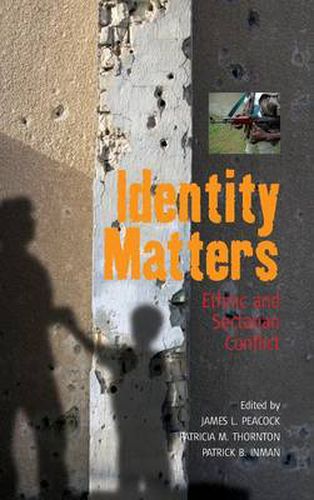Readings Newsletter
Become a Readings Member to make your shopping experience even easier.
Sign in or sign up for free!
You’re not far away from qualifying for FREE standard shipping within Australia
You’ve qualified for FREE standard shipping within Australia
The cart is loading…






This title is printed to order. This book may have been self-published. If so, we cannot guarantee the quality of the content. In the main most books will have gone through the editing process however some may not. We therefore suggest that you be aware of this before ordering this book. If in doubt check either the author or publisher’s details as we are unable to accept any returns unless they are faulty. Please contact us if you have any questions.
In response to the attacks of September 11, 2001 and war in Afghanistan, the Fulbright New Century Scholars program brought together social scientists from around the world to study sectarian, ethnic, and cultural conflict within and across national borders. As one result of their year of intense discussion, this book examines the roots of collective violence - and the measures taken to avoid it - in Burma (Myanmar), China, Germany, Pakistan, Senegal, Singapore, Thailand, Tibet, Ukraine, Southeast Asia, and Western Europe.
Case studies and theoretical essays introduce the basic principles necessary to identify and explain the symbols and practices each unique human group holds sacred or inalienable. The authors apply the methods of political science, social psychology, anthropology, journalism, and educational research. They build on the insights of Gordon Allport, Charles Taylor, and Max Weber to describe and analyze the patterns of behavior that social groups worldwide use to maintain their identities.
Written to inform the general reader and communicate across disciplinary boundaries, this important and timely volume demonstrates ways of understanding, predicting and coping with ethnic and sectarian violence.
Contributors: Badeng Nima, David Brown, Kwanchewan Buadaeng, Patrick B. Inman, Karina V. Korostelina, James L. Peacock, Thomas F. Pettigrew, Wee Teng Soh, Hamadou Tidiane Sy, Patricia M. Thornton, Mohammad Waseem.
$9.00 standard shipping within Australia
FREE standard shipping within Australia for orders over $100.00
Express & International shipping calculated at checkout
This title is printed to order. This book may have been self-published. If so, we cannot guarantee the quality of the content. In the main most books will have gone through the editing process however some may not. We therefore suggest that you be aware of this before ordering this book. If in doubt check either the author or publisher’s details as we are unable to accept any returns unless they are faulty. Please contact us if you have any questions.
In response to the attacks of September 11, 2001 and war in Afghanistan, the Fulbright New Century Scholars program brought together social scientists from around the world to study sectarian, ethnic, and cultural conflict within and across national borders. As one result of their year of intense discussion, this book examines the roots of collective violence - and the measures taken to avoid it - in Burma (Myanmar), China, Germany, Pakistan, Senegal, Singapore, Thailand, Tibet, Ukraine, Southeast Asia, and Western Europe.
Case studies and theoretical essays introduce the basic principles necessary to identify and explain the symbols and practices each unique human group holds sacred or inalienable. The authors apply the methods of political science, social psychology, anthropology, journalism, and educational research. They build on the insights of Gordon Allport, Charles Taylor, and Max Weber to describe and analyze the patterns of behavior that social groups worldwide use to maintain their identities.
Written to inform the general reader and communicate across disciplinary boundaries, this important and timely volume demonstrates ways of understanding, predicting and coping with ethnic and sectarian violence.
Contributors: Badeng Nima, David Brown, Kwanchewan Buadaeng, Patrick B. Inman, Karina V. Korostelina, James L. Peacock, Thomas F. Pettigrew, Wee Teng Soh, Hamadou Tidiane Sy, Patricia M. Thornton, Mohammad Waseem.